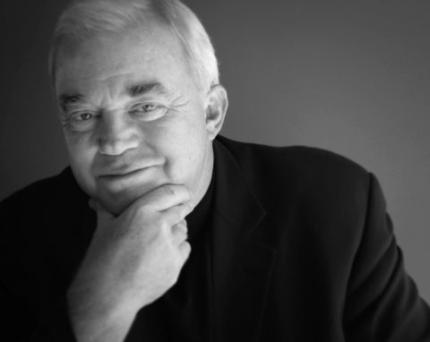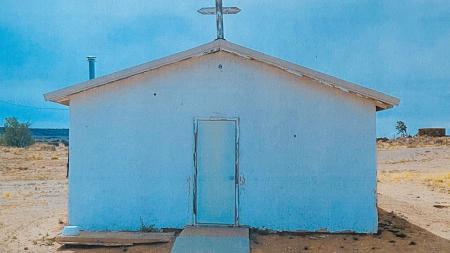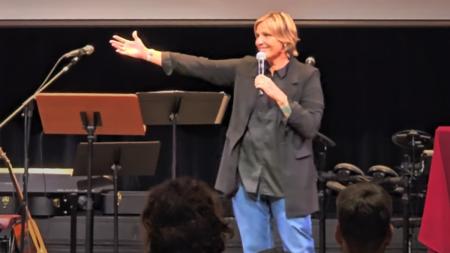Combating the 'Original Sin' of Racism

Jim Wallis
Sojourners magazine
Jim Wallis couldn’t understand why his church, school, and parents failed to teach him about the people living in another world, only blocks from his working-class neighborhood in a suburb of Detroit, Mich.
“As a teenager, I was listening to my city, reading the newspapers, having conversations with people,” writes Wallis in his new book, America’s Original Sin: Racism, White Privilege, and the Bridge to a New America.
“I wondered why life in black America seemed so different from life in the white suburbs. I didn’t know any hungry people or dads without jobs, and I didn’t have any family members who had ever been in jail.”
Wallis’s curiosity compelled him, once he learned to drive, to take a job in downtown Detroit as a janitor at an electric company, so that he could meet and work with people from another race, he said in an interview before speaking about his book and the topic of race relations Monday night at Calvin College.
It was while working at the electric company, he said, that he met Butch, a black man who gave him a glimpse into that other world and put him on the path he is following yet today.
Butch told him about the challenges of being black in Detroit, about the fear that black people had for the police, and about how black families were locked into their neighborhoods and jobs by a system of privilege that was created to keep them separate from whites.
“Butch and I were born in the same city, but we grew up in different countries,” said Wallis.
In learning about racism and its effects, Wallis left the church for a time, reasoning that the things he learned from Butch and others ran counter to what he believed the church should be about.
But he returned to the church and is today an ordained minister, a Christian activist, and the editor of the progressive evangelical magazine Sojourners. He is also the founder of the Sojourners Christian community in Washington, D.C., and has served as a spiritual adviser to President Obama.
What brought Wallis back to the church, he said, was his reading of Scripture that talks of reaching out to “the least of these” and how God created all people in his image.
“I’ve come to see how race cuts to the core of the Christian gospel,” said Wallis during his talk at Calvin. “To do what we have done to black people and other minorities in this country is to throw away the image of God.”
When we throw away the image of God, he added, we “fall into the original sin of slavery, to this idea that these people are less than we are. . . . Slavery never ended in this country; it has evolved.”
Wallis spoke at Calvin during a town hall meeting presented by the college’s new Center for Faith and Writing. His talk was sponsored by several college departments, by his publisher Brazos Press, and by the CRC’s Office of Social Justice.
Walking from side to side on the stage at the Calvin Fine Arts Center, Wallis said he began his new book soon after Trayvon Martin, a black teen, was killed in February 2012 in a confrontation with a white man in Florida.
Since starting the project, many other things have happened that have influenced the book.
Wallis writes of how several black men have been killed by white police officers, and of how protests have erupted in the wake of those killings.
He especially writes about the protests that took place in Ferguson, Mo., where Michael Brown, a young black man, was shot by a police officer—and of the Black Lives Matter movement that grew as a result.
In addition, he writes about how nine black church members were killed in June 2015 during a Bible study at a church in Charleston, S.C., by a white man.
“When the killer entered the church, he was welcomed by the church members, and he sat with them for more than an hour before he pulled out his gun and shot them,” says Wallis in in his book. “They were targeted . . . because they were black.”
Combating racial violence such as this, and racism itself, is all about how you view your faith, and especially baptism, Wallis said at Calvin.
“Do we believe we are baptized into a world in which we are all made in the image of God?” Wallis asked.
The Black Lives Matter movement, he said, reflects a new theology of racial cohesiveness, a sense that it is time to speak out and act together as people of God to challenge the structures that keep racism in place, said Wallis.
“Here is what we need to do: We need to bring people across a new boundary and build a bridge to a new America,” he said.
And the institution that is in the best position to do this, to build that bridge, he says, is the church. “There is no other social space that could provide the leadership and lead us to a new demographic,” he said.
But for that to happen, white Christians need to look at themselves, at their own collective history, and repent, seeking God’s forgiveness for being part of a society that has pushed the least ones, the minorities, to the margins, said Wallis.
“Repentance is what we do in response to sin; it is not just feeling guilty or saying ‘I’m sorry.’ It is about turning around and moving into a whole new relationship with my brothers and sisters,” he said.
“We need to set our souls free from the lie that we are different in the eyes of God. ... We need to learn to speak truth to power and decide that all lives don’t matter until black lives matter.”


